Results
-
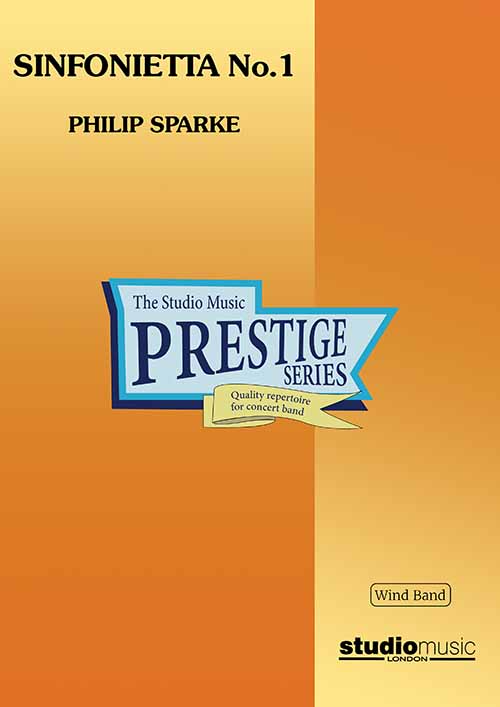 £27.95
£27.95Sinfonietta No.1 (Concert Band - Score only) - Sparke, Philip
Sinfonietta No.1 was commissioned by the Foundation of Friends of the Marine Band of the Royal Netherlands Navy. It was first performed by them in 'De Doelen', Rotterdam on the 13th November 1990 (in a joint concert with the Royal Marines Band from Great Britain) which celebrated the 325th anniversary of the Netherlands Marine Corps and coincided with the 45th anniversary of the band and the 175th anniversary of naval music in the Netherlands.The work is in three, linked movements:I: OvertureSeveral contrasting motivic ideas open the work, but none manage to develop into a theme of any sort. Eventually a short theme appears on clarinet, alto saxophone and horn but it is swept away by runs of triplets from the woodwinds. The theme returns, accompanied by the triplets from the woodwinds. The theme returns, accompanied by the triplets, and this leads to a return of the opening material to close the movement.II: AriaThe second movement opens with violent outbursts from the timpani until a simple, mournful tune is presented by flute and bassoon over a sparse accompaniment by the lower brass. Trumpets introduce a quicker, turbulent central section but this leads back to a brief repeat of the original tune, bringing the movement to a peaceful close.III. ScherzoThe final movement is a fast and furious scherzo which bursts into life with a flurry of notes. The vivacious main (woodwind) theme is first played by the flutes and then by the whole woodwind section. A cornet then takes centre stage with a fanfare-like theme which is then taken up by the brass. A bridge passage then leads to a version of this theme for full band. The original flute tune is then developed until the horns introduce a chorale tune which is taken up by saxes and then full band until the opening material reappears. The woodwind and brass themes are then combined and lead to a forceful version of the chorale which becomes more and more dissonant until the opening of the Overture returns to bring the work to a rousing finish.Recorded on QPRM134D THE KINGS GO FORTH, Central Band of the Royal Air Force
Estimated dispatch 7-14 working days
-
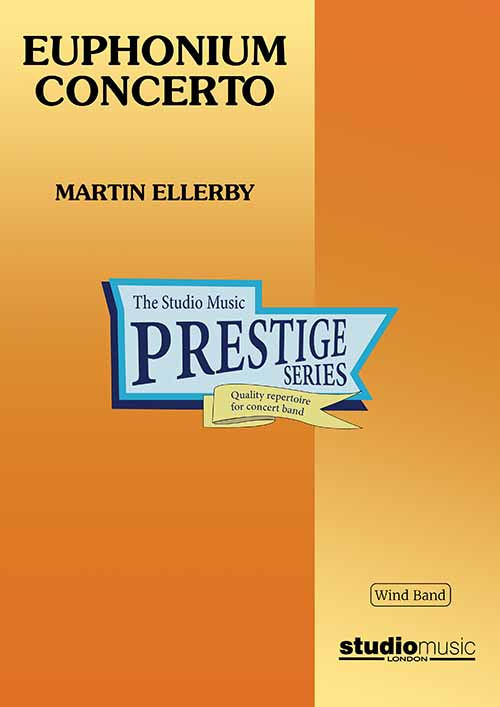 £164.95
£164.95Euphonium Concerto (Concert Band - Score and Parts) - Ellerby, Martin
This Euphonium Concerto was written between late 1994 and early 1995 in response to a commission from Steven Mead to whom the work is dedicated. It is cast in four movements and lasts a little over 22 mins:I. Fantasy: After the briefest of introductions, the solo euphonium enters with the key melodic phrase of the movement in a fast 'Tempo I'. This idea is developed up to the point where a slower 'Tempo II' breaks the argument - here the mood is reflective but it is only to be a brief interruption as 'Tempo I' returns very quickly. The opening material is then subjected to further transformation with 'Tempo II' making occasional returns en route, the distances between the contrasting tempi becoming ever closer, and the movement closes in a rather soft though definite manner.II. Capriccio: This relatively short presto movement forms a bridge between the first movement and the work's slow movement. The majority of the band parts are bright and muted with the percussion players enhancing the texture with contributions from xylophone, glockenspiel and vibraphone. Again the initial solo euphonium phrase provides the basis for almost all the movement's material. This is extremely virtuosic for the soloist and band alike and makes great play of the rhythmic possibilities of combining simple and compound music either in close proximity or together.III. Rhapsody (for Luis): A Lento movement, sitting between two different but essentially rapid ones, this provides the work's emotional core exploiting the soloist's cantabile qualities in an almost seamless fashion. Again, as will all the work's movements, the initial idea paves the way for subsequent development, eventually culminating in a passionate climax; thereafter it winds down with an affectionate backward glance towards the close of the the slow movement of the Euphonium Concerto of Joseph Horovitz, whose mark had been made indelibly on the euphonium repertoire. This movement is dedicated to Luis Maldonado who set the full score of the brass version before his untimely death.IV. Diversions: The work's variation finale is cast in 3/4 throughout though the barline is often a guideline and was seen by the composer as a challenge of metrical restraint! There is an obvious jazz feel to this movement (both rhythmically and harmonically) with a swaggering ritornello theme first announced by the solo euphonium. Thereafter follows a series of interludes and 'adjusted' returns of the main theme. A lyrical idea is allowed to enter but the underlying momentum is ever present. The band also contributes to the interludes and eventually the tempo increases towards a 'wild' and absolute conclusion.Duration: 22.30Recorded on QPRM143D Dreamscapes, Royal Northern College of Music Wind Orchestra
Estimated dispatch 7-14 working days
-
 £32.95
£32.95Euphonium Concerto (Concert Band - Score only) - Ellerby, Martin
This Euphonium Concerto was written between late 1994 and early 1995 in response to a commission from Steven Mead to whom the work is dedicated. It is cast in four movements and lasts a little over 22 mins:I. Fantasy: After the briefest of introductions, the solo euphonium enters with the key melodic phrase of the movement in a fast 'Tempo I'. This idea is developed up to the point where a slower 'Tempo II' breaks the argument - here the mood is reflective but it is only to be a brief interruption as 'Tempo I' returns very quickly. The opening material is then subjected to further transformation with 'Tempo II' making occasional returns en route, the distances between the contrasting tempi becoming ever closer, and the movement closes in a rather soft though definite manner.II. Capriccio: This relatively short presto movement forms a bridge between the first movement and the work's slow movement. The majority of the band parts are bright and muted with the percussion players enhancing the texture with contributions from xylophone, glockenspiel and vibraphone. Again the initial solo euphonium phrase provides the basis for almost all the movement's material. This is extremely virtuosic for the soloist and band alike and makes great play of the rhythmic possibilities of combining simple and compound music either in close proximity or together.III. Rhapsody (for Luis): A Lento movement, sitting between two different but essentially rapid ones, this provides the work's emotional core exploiting the soloist's cantabile qualities in an almost seamless fashion. Again, as will all the work's movements, the initial idea paves the way for subsequent development, eventually culminating in a passionate climax; thereafter it winds down with an affectionate backward glance towards the close of the the slow movement of the Euphonium Concerto of Joseph Horovitz, whose mark had been made indelibly on the euphonium repertoire. This movement is dedicated to Luis Maldonado who set the full score of the brass version before his untimely death.IV. Diversions: The work's variation finale is cast in 3/4 throughout though the barline is often a guideline and was seen by the composer as a challenge of metrical restraint! There is an obvious jazz feel to this movement (both rhythmically and harmonically) with a swaggering ritornello theme first announced by the solo euphonium. Thereafter follows a series of interludes and 'adjusted' returns of the main theme. A lyrical idea is allowed to enter but the underlying momentum is ever present. The band also contributes to the interludes and eventually the tempo increases towards a 'wild' and absolute conclusion.Duration: 22.30Recorded on QPRM143D Dreamscapes, Royal Northern College of Music Wind Orchestra
Estimated dispatch 7-14 working days
-
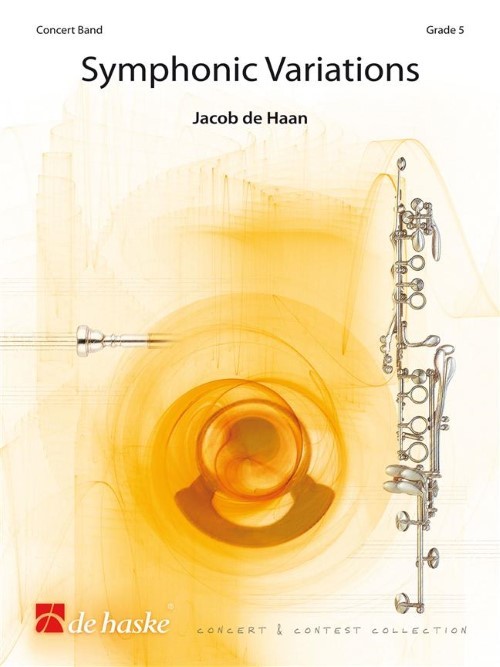 £154.99
£154.99Symphonic Variations (Concert Band - Score and Parts) - De Haan, Jacob
This composition is based on a passacaglia theme, in which artistic perfection, symphonic drama and oriental melody lines play a role. The passacaglia is originally a dance made up of a series of variations above a bass line constantly present as an ostinato. It is not in this sense that the "Symphonic Variations" are in the passacaglia form but in the sense of the open form of the variations. Jacob de Haan, himself originally an organist, took his inspiration for this piece from the famous passacaglia for organ in C-minor by J.S. Bach. Following the introduction of the passacaglia theme (in the bass) the entry by the trumpets and trombones forms the majestic start to a musical adventure, in which this theme (often fragmentary) returns in variations. Then there follow two faster movements with dramatic contrasts and virtuose passages. Particularly striking here is the use of two characteristic intervals from the beginning of the theme namely the minor second and the augmented fourth. An apause in the composition comes in the slow bridge where a syncopated bourdon (perfect fifth) is constantly repeated. The tension grows in dynamics and harmony, and the oriental-flavour becomes obvious in the melody. We arrive at a faster movement via an accelerando, in which a perpetuum mobile based on the passacaglia theme is central. Finally the whole flows into a martial theme, in which the ostinato accompaniment n the descant derives from the passacaglia theme.Duration: 11:15
Estimated dispatch 7-14 working days
-
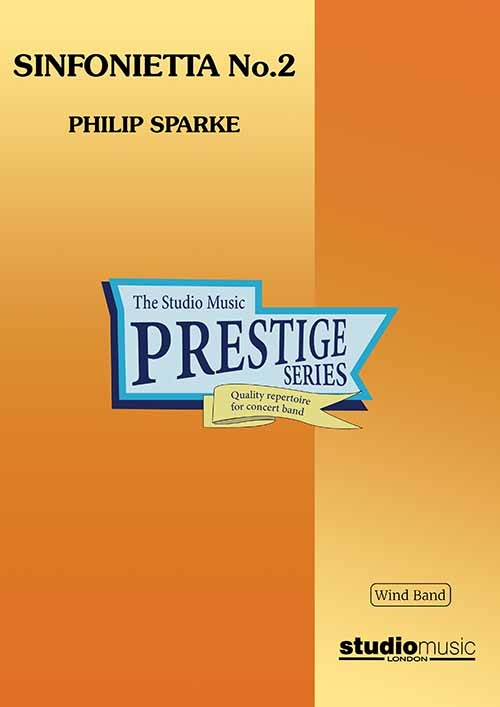 £164.95
£164.95Sinfonietta No.2 (Concert Band - Score and Parts) - Sparke, Philip
Commissioned by the National Youth Orchestra of Great Britain and first performed by them on 6th August 1992.1. Overture: VivaceA bustling opening movement in sonata form. After an introduction in which a syncopated theme is tossed around the band, the first subject proper gives way to a more legato second theme. A scherzando bridge passage leads to the recapitulation.2. Serenade: Lento ExpressivoA short introduction leads to a sonorous theme from the middle of the band. A slightly more rhythmic central 5/8 section leads to a short cadenza-like duet for two alto saxes which reintroduces the opening of the movement.3. Finale: Molto VivaceA fast and furious finale which fails to settle long enough for a real theme to develop as motivic ideas are thrown from player to player. Eventually a violently syncopated tune emerges from the middle of the band but this is interrupted by a reflective interlude. In time the faster music returns and the movement hurtles to a close.Duration: 16.10Recorded on QPRM124D MIGHTY VOICE, Great British Music for Wind Band Vol.3
Estimated dispatch 7-14 working days
-
 £32.95
£32.95Sinfonietta No.2 (Concert Band - Score only) - Sparke, Philip
Commissioned by the National Youth Orchestra of Great Britain and first performed by them on 6th August 1992.1. Overture: VivaceA bustling opening movement in sonata form. After an introduction in which a syncopated theme is tossed around the band, the first subject proper gives way to a more legato second theme. A scherzando bridge passage leads to the recapitulation.2. Serenade: Lento ExpressivoA short introduction leads to a sonorous theme from the middle of the band. A slightly more rhythmic central 5/8 section leads to a short cadenza-like duet for two alto saxes which reintroduces the opening of the movement.3. Finale: Molto VivaceA fast and furious finale which fails to settle long enough for a real theme to develop as motivic ideas are thrown from player to player. Eventually a violently syncopated tune emerges from the middle of the band but this is interrupted by a reflective interlude. In time the faster music returns and the movement hurtles to a close.Duration: 16.10Recorded on QPRM124D MIGHTY VOICE, Great British Music for Wind Band Vol.3
Estimated dispatch 7-14 working days
-
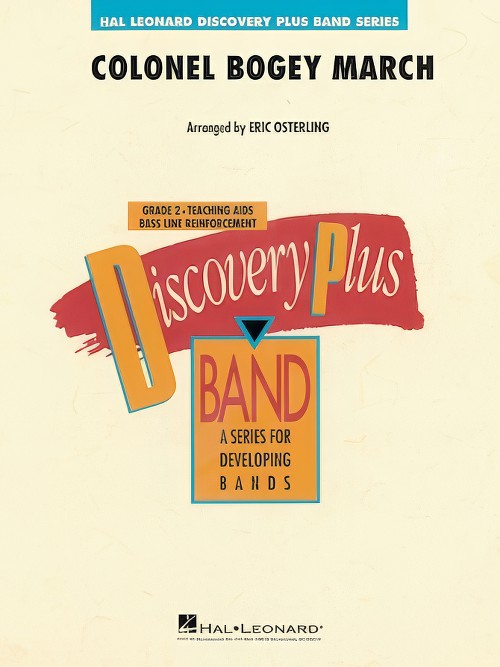 £53.50
£53.50Colonel Bogey March (Concert Band - Score and Parts) - Alford, Kenneth J. - Osterling, Eric
The classic march from the film, 'The Bridge Over The River Kwai,' available in a very playable version for younger groups. Includes the trademark whistling part (optional).
Estimated dispatch 7-14 working days
-
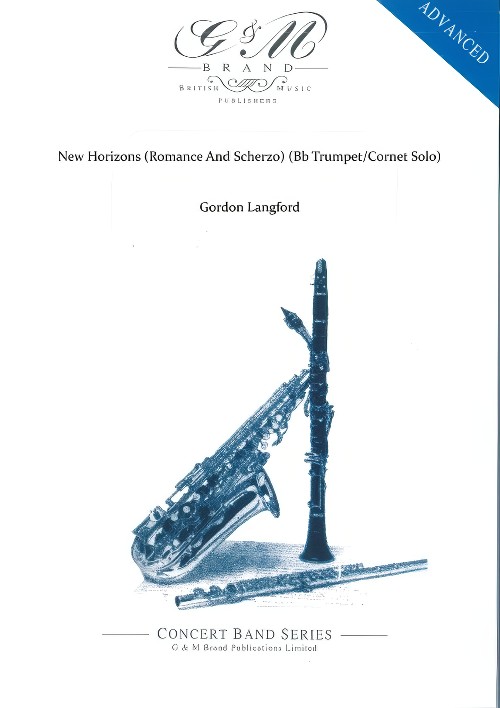 £84.95
£84.95New Horizons (Romance And Scherzo) (Bb Trumpet/Cornet Solo) (Concert Band - Score and Parts) - Langford, Gordon
The sub-title 'Romance and Scherzo' - aptly describes this work, a real show-piece for the Trumpet or Cornet. The solo line has everything for the live performance: the quiet, thoughtful beginning uses strong melodic material and leads, after a short bridge and with a flourish to the scherzo.
Estimated dispatch 7-14 working days
-
 £16.95
£16.95New Horizons (Romance And Scherzo) (Bb Trumpet/Cornet Solo) (Concert Band - Score Only) - Langford, Gordon
The sub-title 'Romance and Scherzo' - aptly describes this work, a real show-piece for the Trumpet or Cornet. The solo line has everything for the live performance: the quiet, thoughtful beginning uses strong melodic material and leads, after a short bridge and with a flourish to the scherzo.
Estimated dispatch 7-14 working days
-
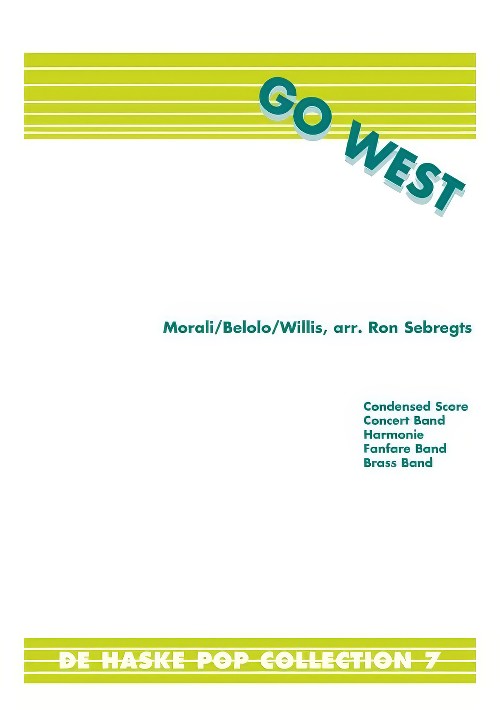 £76.99
£76.99Go West (Concert Band - Score and Parts) - Sebregts, Ron
The Pet Shop Boys are one of the finest examples of an English electro pop group. Since their formation in the early 1980s they have had 38 top 40 hits in the UK and are still often in the charts today. This highly inventive duo owes their long-term career to the ability to bridge melodic pop and dance music with intelligence and style. Go West was one of their hits from 1993 and this arrangement by Ron Sebregts retains all the splendour of the original. A fantastic pop arrangement which will have all your audience dancing in the aisles.Duration: 3:40
Estimated dispatch 7-14 working days
